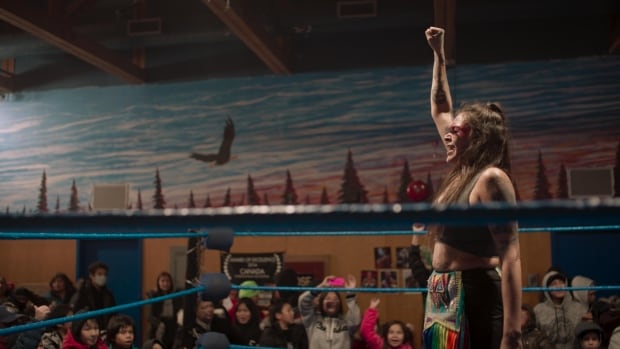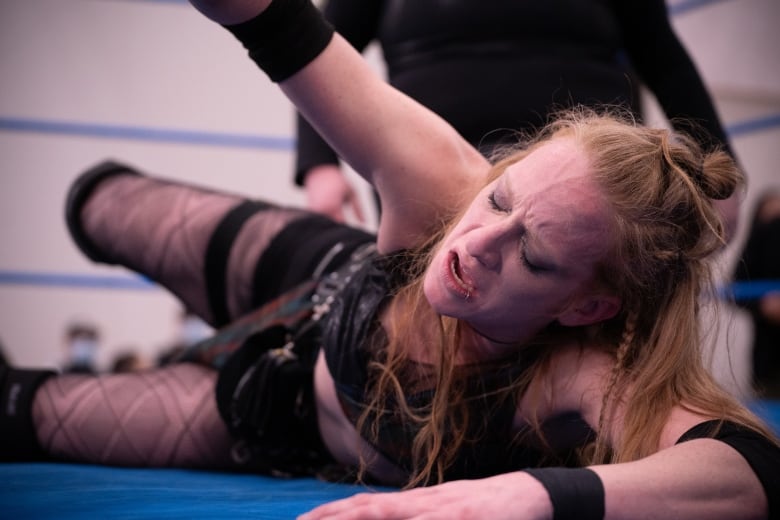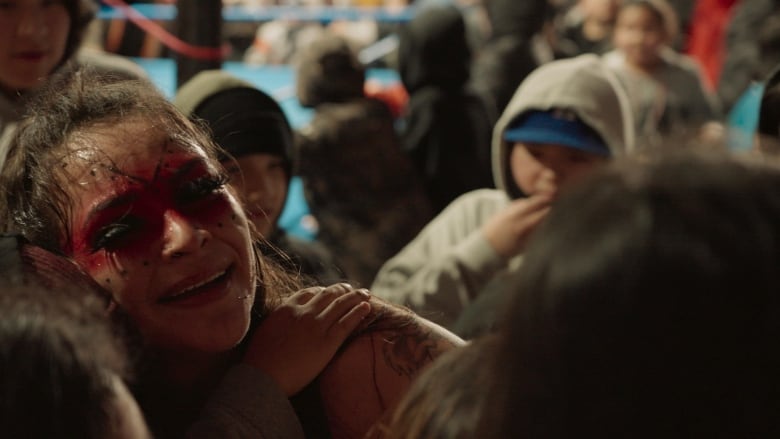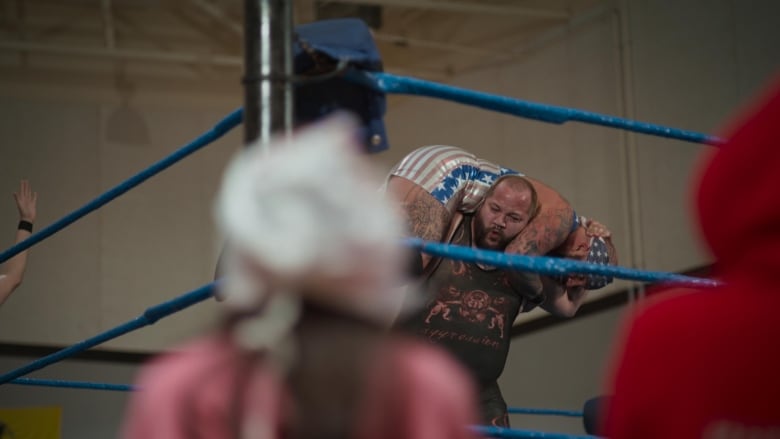
Director Stephan Peterson was working on a shoot in the northern Manitoba community of Wasagamack in the winter of 2016 when, as he was hunkering down for the evening one night after work, he got word:
Wrestling was in town.
“I bought a ticket and took a seat right as the first match began,” the Montreal-based director said.
He watched rapt as wrestling heels and heroes whipped up the exuberant crowd into a frenzy with their theatrics and athleticism in the ring.
He was witnessing “the Death Tour,” and it changed his life.
That night at ringside, inspiration struck and a documentary idea was born.
Eight years later, the documentary The Death Tour — about the gruelling winter wrestling tour in remote northern Manitoba communities — comes to screens in Winnipeg (and at select cities across Canada).
The film, which Peterson directed, captures the heart and heartache, and the punishment and pride a small group of core wrestlers experience on the indie wrestling tour. More than a wrestling film, The Death Tour reveals how wrestling can heal broken people, inside and outside the ring.
The Death Tour is a co-production between H2L Productions and Loaded Pictures for CBC’s Absolutely Canadian. Pro wrestler Chris Jericho (who is from Winnipeg) also appears in the film and was its executive producer.
The Death Tour will stream free on CBC Gem starting Aug. 23, and has its debut Winnipeg screening on Aug. 9 at 7 p.m. at the Dave Barber Cinematheque.
Finding meaning after tragedy
For the uninitiated, the Death Tour is a legendary wrestling tour with a 50-plus year legacy. Organized by wrestling promoter Tony Condello, the multi-community tour is a relentless, gruelling test of endurance.
The tour is renowned in wrestling circles as a proving ground on the indie circuit. Wrestlers endure long drives on ice roads, sleep on gym floors and scrape together meals amidst high food costs in the north.
In the documentary, the tour is paused after unexpected deaths cause communities to shut down to mourn. The wrestlers themselves grapple with those losses and the struggles they also witness in the remote communities they visit.
Capturing those moments made the documentary more than a wrestling film — a distinction that was essential for co-director Sonya Ballantyne.
She says she wasn’t sold on the idea of a Death Tour documentary at first.
“When I met with Steph the first time, I’m like, ‘I don’t want this to be a wrestling documentary,'” said Ballantyne. “I want this to be a documentary about how hurt people find meaning again after they’ve been so devastated by tragedy.”

On the surface, the film is about a crew of charismatic wrestlers performing for hordes of enthusiastic young fans. But the meaning and purpose of The Death Tour lies deeper.
One of those people who found deeper meaning is wrestler Sage (The Matriarch) Morin, a 38-year-old single mom from Edmonton whose story is featured in the documentary. Her two-year-old son, Geo, died after a driver hit the gas pedal instead of the brakes of his SUV, plowing into a restaurant patio in 2013.
She took up wrestling just two years ago, and going on the Death Tour transformed her life, she said.
“Being in the communities, it has been medicine for me. The healing … I just wanted to be a mom and to have a whole bunch of kids myself, but that didn’t happen. But to get to be The Matriarch to these kids, it’s so special to me to be in that role,” said Morin, whose other son, Quentin, survived the crash.

In the documentary, the audience sees Morin and other wrestlers visit schools and speak to youth about their own experiences with drugs, alcohol abuse, bullying and other trauma. They share messages of empowerment and resilience, and try to encourage self-pride, Indigenous pride and hope in the students.
Morin, who is from Saddle Lake Cree Nation in central Alberta, said bringing The Matriarch — her hero character — to First Nations youth is representation in action.
“Being an Indigenous kid [myself] and not having anyone to look up to — all the people in the movies and the magazines, no one looked like me, and no one like me was winning. I am that for them,” Morin said.
Ballantyne said that the tour symbolizes possibility for those in the communities who may not see a hopeful path forward.
“It was pretty cool to have … the kids see so much Indigenous representation in their backyards,” said Ballantyne.
“Ultimately, if the kids decided to go be wrestlers or writers or filmmakers or whatever …. [we wanted] to show them that we were exactly like them at a certain age.”

The Death Tour has its debut Winnipeg screening on Aug. 9 at 7 p.m. at the Dave Barber Cinematheque. The evening includes a meet and greet and Q&A with co-directors Sonya Ballantyne and Stephan Peterson.
The documentary will also run at Dave Barber Cinematheque on Aug. 10, 11 and 18. Click here for tickets and showtimes.
The Death Tour streams free on CBC Gem starting Aug. 23.